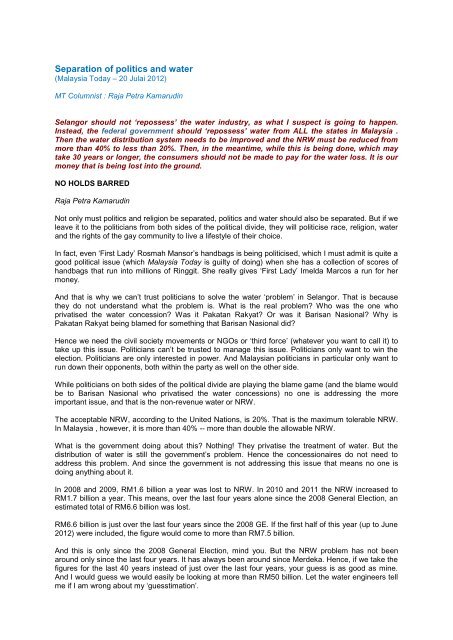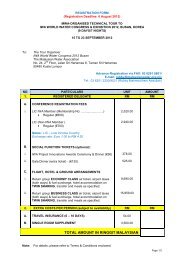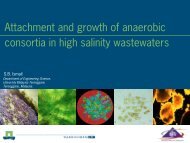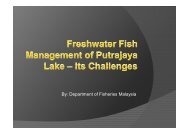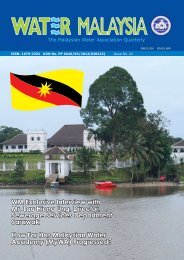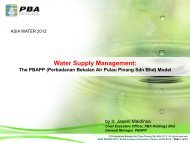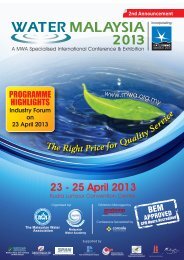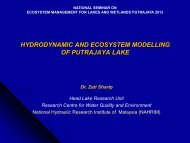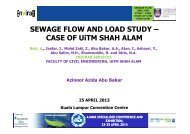Separation of politics and water - Malaysian Water Association.
Separation of politics and water - Malaysian Water Association.
Separation of politics and water - Malaysian Water Association.
Create successful ePaper yourself
Turn your PDF publications into a flip-book with our unique Google optimized e-Paper software.
<strong>Separation</strong> <strong>of</strong> <strong>politics</strong> <strong>and</strong> <strong>water</strong><br />
(Malaysia Today – 20 Julai 2012)<br />
MT Columnist : Raja Petra Kamarudin<br />
Selangor should not ‘repossess’ the <strong>water</strong> industry, as what I suspect is going to happen.<br />
Instead, the federal government should ‘repossess’ <strong>water</strong> from ALL the states in Malaysia .<br />
Then the <strong>water</strong> distribution system needs to be improved <strong>and</strong> the NRW must be reduced from<br />
more than 40% to less than 20%. Then, in the meantime, while this is being done, which may<br />
take 30 years or longer, the consumers should not be made to pay for the <strong>water</strong> loss. It is our<br />
money that is being lost into the ground.<br />
NO HOLDS BARRED<br />
Raja Petra Kamarudin<br />
Not only must <strong>politics</strong> <strong>and</strong> religion be separated, <strong>politics</strong> <strong>and</strong> <strong>water</strong> should also be separated. But if we<br />
leave it to the politicians from both sides <strong>of</strong> the political divide, they will politicise race, religion, <strong>water</strong><br />
<strong>and</strong> the rights <strong>of</strong> the gay community to live a lifestyle <strong>of</strong> their choice.<br />
In fact, even ‘First Lady’ Rosmah Mansor’s h<strong>and</strong>bags is being politicised, which I must admit is quite a<br />
good political issue (which Malaysia Today is guilty <strong>of</strong> doing) when she has a collection <strong>of</strong> scores <strong>of</strong><br />
h<strong>and</strong>bags that run into millions <strong>of</strong> Ringgit. She really gives ‘First Lady’ Imelda Marcos a run for her<br />
money.<br />
And that is why we can’t trust politicians to solve the <strong>water</strong> ‘problem’ in Selangor. That is because<br />
they do not underst<strong>and</strong> what the problem is. What is the real problem? Who was the one who<br />
privatised the <strong>water</strong> concession? Was it Pakatan Rakyat? Or was it Barisan Nasional? Why is<br />
Pakatan Rakyat being blamed for something that Barisan Nasional did?<br />
Hence we need the civil society movements or NGOs or ‘third force’ (whatever you want to call it) to<br />
take up this issue. Politicians can’t be trusted to manage this issue. Politicians only want to win the<br />
election. Politicians are only interested in power. And <strong>Malaysian</strong> politicians in particular only want to<br />
run down their opponents, both within the party as well on the other side.<br />
While politicians on both sides <strong>of</strong> the political divide are playing the blame game (<strong>and</strong> the blame would<br />
be to Barisan Nasional who privatised the <strong>water</strong> concessions) no one is addressing the more<br />
important issue, <strong>and</strong> that is the non-revenue <strong>water</strong> or NRW.<br />
The acceptable NRW, according to the United Nations, is 20%. That is the maximum tolerable NRW.<br />
In Malaysia , however, it is more than 40% -- more than double the allowable NRW.<br />
What is the government doing about this? Nothing! They privatise the treatment <strong>of</strong> <strong>water</strong>. But the<br />
distribution <strong>of</strong> <strong>water</strong> is still the government’s problem. Hence the concessionaires do not need to<br />
address this problem. And since the government is not addressing this issue that means no one is<br />
doing anything about it.<br />
In 2008 <strong>and</strong> 2009, RM1.6 billion a year was lost to NRW. In 2010 <strong>and</strong> 2011 the NRW increased to<br />
RM1.7 billion a year. This means, over the last four years alone since the 2008 General Election, an<br />
estimated total <strong>of</strong> RM6.6 billion was lost.<br />
RM6.6 billion is just over the last four years since the 2008 GE. If the first half <strong>of</strong> this year (up to June<br />
2012) were included, the figure would come to more than RM7.5 billion.<br />
And this is only since the 2008 General Election, mind you. But the NRW problem has not been<br />
around only since the last four years. It has always been around since Merdeka. Hence, if we take the<br />
figures for the last 40 years instead <strong>of</strong> just over the last four years, your guess is as good as mine.<br />
And I would guess we would easily be looking at more than RM50 billion. Let the <strong>water</strong> engineers tell<br />
me if I am wrong about my ‘guesstimation’.
In short, since the 2008 General Election, almost RM18 billion worth <strong>of</strong> <strong>water</strong> was ‘manufactured’ <strong>and</strong><br />
only RM10.5 billion was ‘sold’. RM7.5 billion was lost.<br />
And who pays for this loss? Why, we, the consumers, <strong>of</strong> course. Someone has to pay <strong>and</strong> for sure the<br />
businessmen who are making money from the <strong>water</strong> privatisation are not going to pay for that loss.<br />
We are paying for that loss to help the businessmen make money.<br />
Selangor faces the highest NRW followed by Johor (Deputy Prime Minister Muhyiddin Yassin’s home<br />
state) <strong>and</strong> Sabah . Selangor looses about RM600 million a year or an estimated RM2.7 billion since<br />
Pakatan Rakyat took over the state.<br />
Is Anwar Ibrahim, the Economic Adviser <strong>of</strong> Selangor, or Khalid Ibrahim, its Menteri Besar, aware <strong>of</strong><br />
this? Do Ronnie Liu or Rafizi Ramli know about this? And if they do why has this issue been swept<br />
under the carpet?<br />
To be fair to Anwar, Khalid, Ronnie <strong>and</strong> Rafizi, though, it is not their fault. They did not privatise<br />
Selangor’s <strong>water</strong>. Barisan Nasional did. And this is not a four-year old problem. It is a 100 year-old<br />
problem, since before Merdeka.<br />
Hence the government should not just privatise the treatment <strong>of</strong> <strong>water</strong>. In fact, the <strong>water</strong> treatment<br />
plants should not even be privatised in the first place. <strong>Water</strong> is a strategic industry so it should remain<br />
in the h<strong>and</strong>s <strong>of</strong> the government.<br />
Unfortunately, <strong>water</strong> is a state resource, as was oil <strong>and</strong> gas. Since they nationalised oil <strong>and</strong> gas in<br />
1974 by Act <strong>of</strong> Parliament (Petroleum Development Act 1974) then they should also nationalise <strong>water</strong><br />
(<strong>Water</strong> Development Act 2012, maybe?).<br />
Then all the state <strong>water</strong> resources should come under Air Nasional Berhad (AINAS sounds as good<br />
as PETRONAS, no?). Oil <strong>and</strong> gas, electricity, security, defence, foreign policy, etc. are all ‘strategic<br />
industries’ <strong>and</strong>, hence, are all nationalised. <strong>Water</strong> is also a strategic industry. But why are the states<br />
still managing its <strong>water</strong> resources? Should not <strong>water</strong> also be under federal control?<br />
Selangor should not ‘repossess’ the <strong>water</strong> industry, as what I suspect is going to happen. Instead, the<br />
federal government should ‘repossess’ <strong>water</strong> from ALL the states in Malaysia . Then the <strong>water</strong><br />
distribution system needs to be improved <strong>and</strong> the NRW must be reduced from more than 40% to less<br />
than 20%. Then, in the meantime, while this is being done, which may take 30 years or longer, the<br />
consumers should not be made to pay for the <strong>water</strong> loss. It is our money that is being lost into the<br />
ground.<br />
I know not only Selangor will disagree with this. All the states will disagree. But let’s face it: the states<br />
will not be able to reduce the NRW. To do so will take years <strong>and</strong> at great cost to the states (with<br />
money they do not have). Maybe more than RM100 billion or RM200 billion (I am just guessing) will<br />
be required to change all those AC pipes that were laid 50 or 100 years ago <strong>and</strong> which have since<br />
deteriorated. The government needs to replace the antique AC pipes with ductile iron pipes. And that<br />
is going to cost a bomb. The states, or the <strong>water</strong> concessionaires, will not have the money to do this.<br />
That is my response to the tussle between Barisan Nasional <strong>and</strong> Pakatan Rakyat regarding the <strong>water</strong><br />
problem in Selangor, which is actually a pan-<strong>Malaysian</strong> problem. And let the <strong>water</strong> engineers tell me if<br />
I am wrong. This is not about <strong>politics</strong>. This is about good governance.


